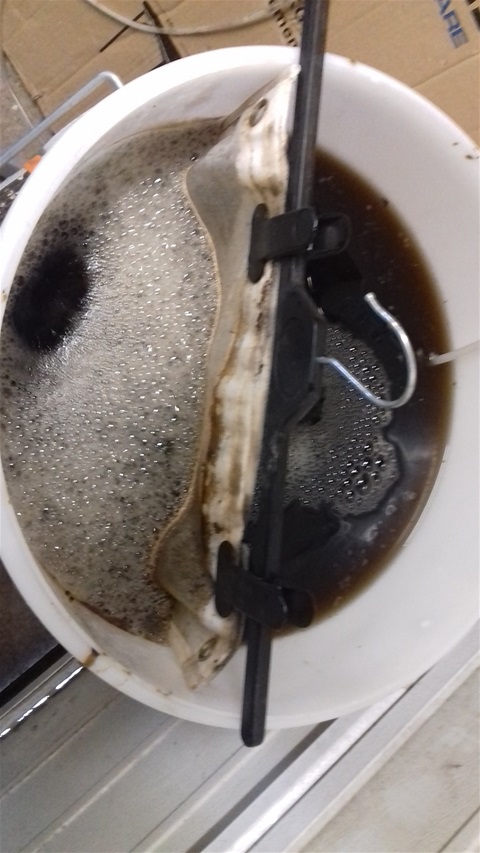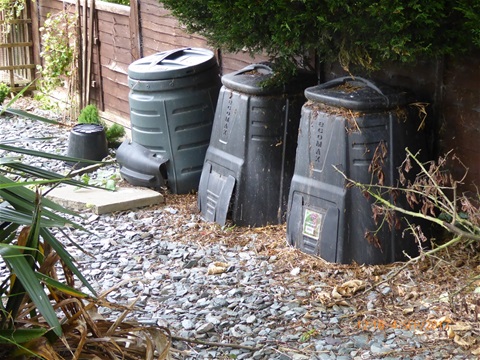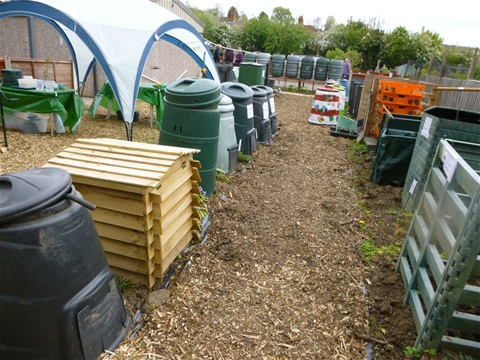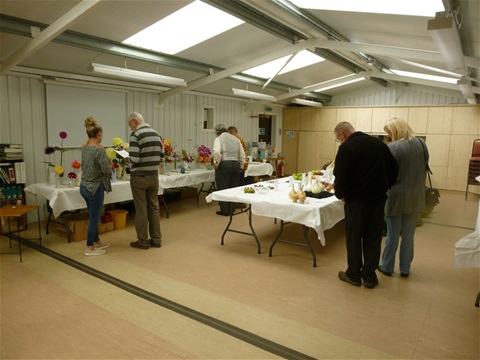Training Session : Compost Teas and Liquid feeds. 4th May
International Compost Awareness Week
1st -7th May 2022
ICAW started in Canada in 1995 and has now spread around the world. Our local councils and allotment societies have been supporting ICAW for many years and will be offering a range of activities to promote composting and reduce waste. The theme for this year is Recipe for regeneration: Compost.
At Stokes Wood Allotment Compost Demonstration site , 2b Stokes Drive Leicester LE3 9BS we will be hosting two events during the week
- Compost Teas and Liquid feeds
Compost teas and liquid feeds made by from plants including garden weeds. can add microbes and nutrients to your soil at little or no cost to you.
A demonstration of how to make liquid feeds by soaking compost and plants including comfrey, horsetail, nettles, and perennial weeds. We will also look at aerating the soaking compost to make aerated compost tea. For further details of liquid feed go to http://www.carryoncomposting.com/142941460
Wednesday 4th May 10.30 - 12.00. Refreshments available from 10am including breakfast. Please email carryoncomposting1@gmail to register for free. Head the email Liquid feeds Places are limited book early.
Introduction to composting Sunday 8th May
An introduction to composting at home and on the allotment. Learn how to make compost from the organic household waste e.g., kitchen waste, cardboard and shredded paper as well as from garden plant material from the garden in the form of prunings, grass clippings, flowers, vegetables and leaves.
By compost this waste you can help the environment and enrich your soil in the garden and pots. The site includes a over 20 compost bins ranging from entry level bins (with and without hatches), to more expensive sectional plastic bins, wooden bins, bins suitable for cooked food, wormeries and pallet bins suitable for composting on allotments in banks of three, four or more. For further details of the site go to http://www.carryoncomposting.com/142941482
This session will be held on Sunday 8th May 10.30 - 12.00. Coffee and tea available from 10am. Please email carryoncomposting1@gmail to register. Places are limited book early. There is a small fee of £5 towards the hire of the hall.
Composting Food Waste incl. Cooked Food
Registration form v2 Demo site Cooked Food
Please download this form. When complleted it should be sent to carryoncomposting1@gmail.com
Practical composting courses
Practical Composting Courses at Stokes Wood Allotments, Leicester
Neglected compost bins and heaps are a feature of many allotment sites and it would seem some plot holders would prefer a bonfire or paying the council to process their waste to making their own compost. These bins spoil the look of the site and demonstrate a waste of a valuable means of improving the soil of the allotment. The problem is not confined to allotments, a 2004 survey showed that as many as 40% of householders who had brought a bin and started home composting stopped using because of a lack of composting knowledge. This led to Councils offering leaflets, web pages and trained “master composters” to provide support and advice resulting in a reduction in the dropout rate to 8-14% . In recent years this figure has reduced further to 3.9% which is probably as low as it will go without further intervention.
There are a number of reasons for composters dropping out such as insufficient waste to feed the bins, lack of time as well as specific problems relating to lack of knowledge of composting techniques and specific concerns relating to smells, flies and rats.
From the environmental perspective there is also a problem with cooked food waste which requires special, quite expensive bins to compost at home, although a pre-compost product suitable to be added to a normal compost bin can be produced using a relatively cheap Bokashi system.
To help increase awareness of composting techniques and increase the scope and rate of composting at home and on allotments we are starting a series of low-cost training sessions at the Stokes Wood Allotment Composting Demonstration Site, 2B Stokes Drive, Leicester, LE3 9BS.
The last one-day Introduction to Composting session was planned for May 2020 but was cancelled due to lockdown. We will be offering the programme again soon. The sesion will introduce attendees to the many benefits of composting and help them explore the methods that will best suit their circumstance in a half day format rather than as all day sessions.
The course is designed to equip those new to composting with the basic knowledge and practical experience to compost successfully and take remedial action if things go wrong and provide additional information for those already composting.
It is also suitable for those who have recently taken on a new allotment plot or have purchased or are considering purchasing, a compost bin through a Council subsidized scheme as well as allotment plot holders who wish to extend their knowledge of composting techniques. Allotments and large gardens provide an opportunity for using different composting techniques e.g. trench, lasagne or hot composting. As well as composting solutions to problems with perennial weeds and diseased plant material.
Householders are faced with the difficulty of dealing with both cooked and uncooked kitchen waste and plus a significant amount of grass, if they have a large lawn, which can turn anaerobic and smelly if not dealt with correctly. .
Course content
Participants will receive training to develop a composting skill set, and a knowledge of:
- The environmental benefits of composting and role of composting in reducing waste sent to landfill.
- The Benefits of composting in building a healthy soil.
- The main methods of composting available to the home, allotment and small-scale community compos site.
- Home and allotment composting operations including the use of bins purchased through Council schemes.
- Stages in Microbiological decomposition of organic material during composting
- “Greens and Browns” getting the right mix of materials for effective composting.
- Compost bin “first aid”. Measures to be taken if things go wrong.
- Harvesting and using compost.
The introductory session will include a tour of the demonstration site and practical experience of aerobic composting operations using the wide range of bins available on the demonstration plot. Depending on the weather it may include the sorting of feedstock from the reception bins, the layering and loading of bins, aeration by turning with a fork and aeration tools, use of plastic “dalek” and similar bins and the harvesting of finished compost
While the Introductory session will provide sufficient knowledge to operate and maintain a composting system it will also form the Foundation session for a more detailed and specialist second day with sessions on:
- Traditional three bin hot composting,
- Waste food composting (including cooked food),
- Bokashi fermentation to pickle food waste so that it can be composted in a conventional bin ,
- Wormeries,
- Liquid Feeds (plant & compost teas)
Successful completion of both days will lead to certification as a Compost Mentor.
The courses are priced at only £15 per day (including tea, coffee and lunch) to make them accessible to as many people as possible. All NAS members are welcome
An additional half day session Community Composting will be offered for representatives of allotment sites, community gardens, schools etc. as demand warrants.
Enquiry forms are available below or from carryoncomposting1@gmail.com
Introduction to Composting Programme
One-Day Practical Composting Course:
Introduction to composting
Learn how to make and use compost at the Stokes Wood Allotment Composting Demonstration Site, 2B Stokes Drive, Leicester, LE3 9BS.
The aim of this one-day course will introduce attendees to the many benefits of composting and help them explore the methods that will best suit their circumstances.
The course is designed to equip those new to composting with the basic knowledge and practical experience to compost successfully and take remedial action if things go wrong.
It is specifically designed for those who have recently purchased, or are considering purchasing, a compost bin through a Council subsidized scheme or have recently taken a new allotment plot.
- Participants receive training to develop a composting skill set, and a knowledge of:
- The environmental benefits of composting and role of composting in reducing waste sent to landfill:
- Benefits of composting in building healthy soil
- The main methods of composting available to the home, allotment and small-scale community composter
- Home and allotment composting operations including the use of bins purchased through Council schemes.
- Stages in Microbiological decomposition of organic material during composting
- “Greens and Browns” getting the right mix of materials for effective composting
- Compost bin “first aid”. Measures to be taken if things go wrong
- Harvesting and using compost
The session will include a tour and practical experience of basic aerobic composting operations using the bins available on the demonstration plot. Depending on the weather it may include the sorting of feedstock from the reception bins, the layering and loading of bins, aeration by turning and aeration tools, and the harvesting of finished compost .
Course Administration
The course will be presented by experienced Master Composter(s)
During lockdown please email carryoncomposting@gmail.com expressing interest and we will contact you wilth course details once the restrictions are lifted.
Pre-registration is required for all participants, with pre-payment of the course fee by the student or sponsor
Fee includes refreshments, handouts and participation in course activities. Online material will be available to download at www.carryoncomposting.com
Each session can accommodate 10-16 persons. Course fee £15 per person incl. refreshments.
Introduction to composting
Programme
9.30-10.00 Arrival. Tea and coffee will be available
- Welcome Introductions to the course and participants
- General and compostable waste discarded in the UK
- Environmental and climate issues relating to composting
- Local compostable waste collection and disposal systems
- Garden, allotment and small scale community composting
11.15-11.30 Tea/Coffee Break
- Methods and Techniques: Sheet and lasagne composting, pit and trench, compost pile or heap,
- Types of bin available moulded plastic, tumbler and rotary, wood including pallets.
- Aerobic decomposition in the compost heap
- Composting microbes (bacteria, actinomycetes and fungi) and minibeasts involved in the composting process. Practical
- Compostable materials, Greens and Browns C:N ratio
- Temperature, CO2 , air/water, Particle size – air spaces
13.00-14.00 Lunch (soup and ploughman’s)
- Hot and cold composting, advantages and disadvantages
- Site Visit: types of bin available uses and advantages & disadvantages of different bins.
- Preparation of materials chopping/ shredding/mixing/soaking
- Layering v pre-mixing, Aeration and turning
- Screening and sifting,
- Properties of finished compost.
- Uses of finished compost
3.30 Finish





Wendy Wilson
Please can you advise when the next courses are planned for and are the Wed sessions still running thanks